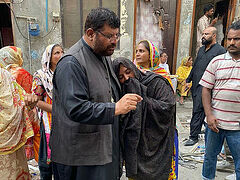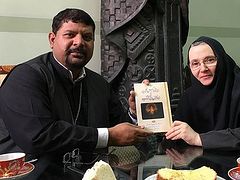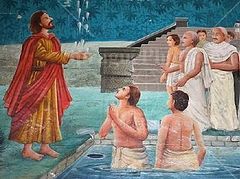The Russian Church Abroad (ROCOR) mission in Pakistan was established twelve years ago, but Fr. Joseph Farooq remains the only ROCOR priest there till now, though there are clerics of other jurisdictions. In an interview, he explained why people from other denominations embrace the Holy Orthodoxy and how the mission lives in a difficult environment in a non-Orthodox country.
 Fr. Joseph Farooq with parishioners
Fr. Joseph Farooq with parishioners
—Dear Father, is it dangerous to be a Christian, particularly an Orthodox Christian, in Pakistan?
—Yes, it is dangerous to be a Christian in Pakistan, and especially an Orthodox Christian. They are suffering, they have difficulties and hardships because the extremist groups are very powerful in Pakistan. However, we live there because this is our country, where we were born. We love our country, we love Pakistan. Christians are not criminals, we do not speak anything against the state and the Constitution. We respect all the laws, and we respect our country.
—I suppose you were born in Islam since Pakistan is a predominantly Muslim country?
—No, I was born in a Christian family that belongs to another denomination. Our ancestors and forefathers embraced different religious faiths: Hinduism, Sikhism, and Islam. The origins of Christianity are very old in Pakistan. It came from British rule, but some historians say that Christianity came to our country with the preaching of the Holy Apostle Thomas.
—What are the features of the life of a Christian mission in a Muslim country? What are the differences?
—We are Christians, but it is very hard to follow Orthodox Christianity in Pakistan. First, because only Orthodoxy is the true faith, and we have to follow all that was taught by the Holy Fathers of the Ecumenical Councils. We have to follow all the rules and traditions of the Orthodox faith.
Besides that, we have some difficulties—for example, as we are following the old calendar. We are celebrating the feast of Nativity, Holy Pascha, the fasts in different days, not like other denominations. People do not know the history and Church traditions, because they are not aware of the true teachings of the Eastern Orthodox Church—the Mother Church. So, sometimes our parishioners come to me and say, “Father, these people are saying this.” I can answer, “There is no problem, because we are following Holy Orthodoxy.”
 But in general, people in Pakistan respect Holy Orthodoxy, they love our traditions and appreciate our veneration of the holy icons and how we are serving the Divine Liturgy. All these things touch their hearts, and they come to me and say, “Father, it helps our spiritual life.”
But in general, people in Pakistan respect Holy Orthodoxy, they love our traditions and appreciate our veneration of the holy icons and how we are serving the Divine Liturgy. All these things touch their hearts, and they come to me and say, “Father, it helps our spiritual life.”
—When people, regular Pakistanis, learn that you are an Orthodox Christian priest, don’t they say you are crazy?
—No, no, no. We’ve had our mission for the last twelve years, so people recognize our church and know that we are Orthodox Christians. They know my clergy cloth, my black cassock, and they understand immediately: Oh, this is an Orthodox priest.
—And to be honest, isn’t it difficult and even dangerous to be Christian in a Muslim country?
—Yes, it is difficult to be an Orthodox Christian in a non-Orthodox country where the majority belongs to other denominations. We have a very small Orthodox community, and sometimes we face problems. However, we are growing day by day, with the blessing of God and with the help of the most Holy Theotokos. I have translated the Divine Liturgy of St. John Chrysostom, Orthodox prayers, and the catechism into Urdu, so people can read them. We have a Sunday school, and we are preaching Holy Orthodoxy in different areas of Pakistan. People from other denominations invite me to preach. Then they become catechumens, learn Orthodoxy, and after six months or a year, we baptize them.
—You’ve already begun answering my next question. How is your mission living, and how do you interact with the environment?
—We are very friendly with other Christians and our Muslim neighbors. We have no problems with them. Everything is good.
—What is the mission’s everyday life?
—Every day I work in my office, people come with different questions. Sometimes, they want to get a birth certificate or ask me to go to the hospital to help somebody who is sick. I help them to get medications or admission to the hospital. People seek support when they have problems, for example, in civil courts, so I go with them. If they want to find a job, I also trying to find them a position. I also help our young parishioners to get admission into school or college. This is my everyday job.
Of course, we have religious services. We visit people in the evening because it is very important that they live strong in the faith. We serve Vigils every Saturday and Divine Liturgies every Sunday morning. We celebrate all the great feasts together. And, yes, I travel a lot every day because it is important to visit our four mission stations in Pakistan.
—You mentioned Sunday school…
—Yes, we have Sunday school and also an adult education center for Christian girls and women. Every evening, they learn how to read and write; they learn Orthodox prayers. They also receive some skills in embroidery and stitching. This center works for all women, even if they belong to other Christian denominations.
—How do your parishioners come to Orthodoxy, and why do they join the Russian church?
—From the time we began our first missionary Orthodox studies in 2010, we have been teaching about the differences between the Orthodox Church and other denominations. So, when people listen to our teaching, they can see the differences. There were so many people attracted; they found real spirituality and real strength in the Orthodox church. They saw how we love the Most Holy Theotokos, how we celebrate feasts, and how we venerate icons. They saw true worship, with nothing mixed in. People love this; they embrace Holy Orthodoxy because they know that in the Orthodox church, we never use other things in the Divine services like other churches do. They like how we enter the church, how we venerate, that we have candles and incense—so many things. And people do not want to go back.
—What support does your mission need, and how can people, from Russia for example, help?
—Yes, the Russians can help us by sending missionaries to Pakistan and supporting us financially. At the government level, they can speak to the Pakistani authorities and tell them that they must protect and help Christians in Pakistan. Our government has land, so they can provide it to the Orthodox community to build an Orthodox church there.
Also, we ask our kind donors to help because we need funds to build an administrative office and a large temple. Until recently, we had a small prayer house. Now, with the blessing of Metropolitan Nicholas, we renovated it into to a holy temple so that people could worship according to the true traditions of the Orthodox Church.






